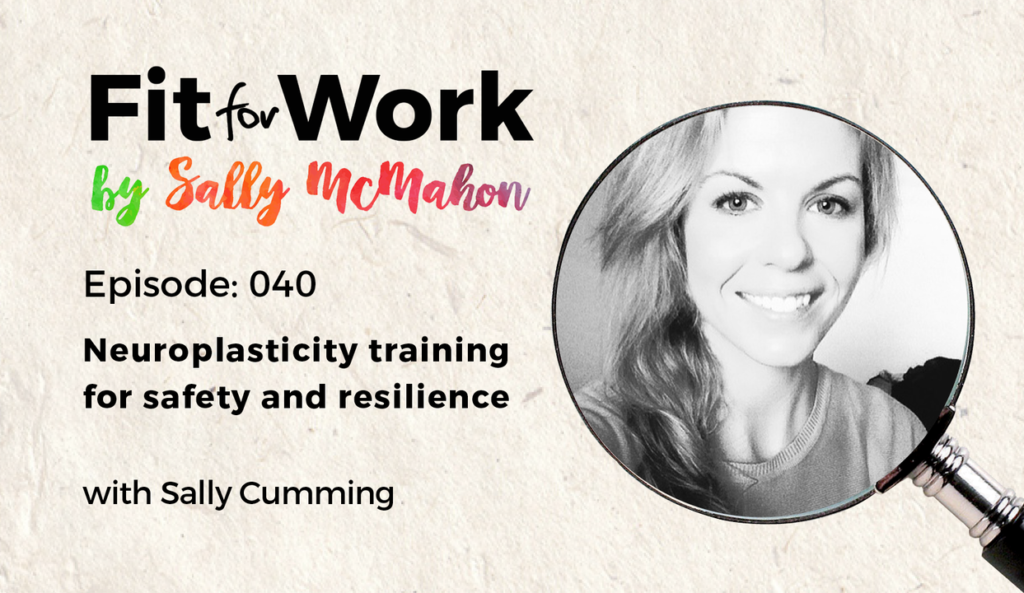Category Archives: Uncategorized
Mental Health Prevention- What Does An Effective Prevention Program Entail?
Mental health conditions present substantial costs to organisations. However, through the successful implementation of an effective program to create a mentally healthy workplace, organisations, on average, can expect a positive return on investment (ROI) of 2.3. That is, for every dollar spent on prevention programs, there is an average return of $2.30 gained by the organisation.
So what does an effective prevention program entail?
A two-tiered training program is an essential strategy for delivering better mental health outcomes for managers and all employees. A program that does not also provide self-care and psychological resilience training for all employees will be ineffective. This top-down approach provides the necessary prevention tools for self-awareness and self-regulation and supports long-term mental health on an emotional and psychological level. This combined approach to both mindful leadership training, as well as mental health awareness training, assists managers with supporting employees mindfully, positively and effectively.
The objective of our mindful leadership program is to improve mindfulness and emotional intelligence related to self-care as well as leading, managing and supporting employees. The training helps strengthen and develop the communication and trust between team managers and staff members. Managers learn evidence-based practices and tools for the cultivation of self-regulation and resilience, which also assists them with enhancing their own self-awareness and leadership skills.
Mindful Manager Training for a Mentally Healthy Workplace
In 2018 we conducted a pilot study of our Mindful Leadership Training with Child Protection at the Department of Health and Human Services. Here are the results:
- 94% Found the training very enjoyable and engaging.
- 100% Found the training useful in understanding stress reactivity and how to recognise when stress is building.
- 98% Agree the tools provided in the training pack will be useful for the workplace.
- 94% Feel the tools they have learnt will help them remain calm and in control when faced with difficult or challenging situations and feel better equipped to recognise habitual thought and behaviour patterns.
- 92% Agree the training was helpful in developing their skills as a leader (e.g. mindful listening, non-judgment, effective communication, building trust).
- 90% Have a greater understanding of the benefits of mindfulness and its role at work and at home.
- 90% Have learnt effective ways to minimise distractions and improve concentration and focus.
- 92% Feel more confident strengthening relationships and trust in their team.
- 80% Agree the training has helped them be a more positive leader and role model in the workplace.
- 90% Feel more confident integrating mindfulness practices into team meetings (if applicable).
- 80% Feel better equipped to process difficult or strong emotions.
- 82% Feel more able to recognise the early signs of distress, poor mental health and mental illness.
- 84% Feel more confident supporting a distressed team member immediately and following an emotional crisis or difficult event.
A course outline is available upon request. I look forward to continuing discussions around supporting the long-term mental health of employees within your organisation.
Mindful May- Create A Resilient Workplace
Mindful May is approaching fast. Have you made plans yet?
This May we are committed to building mentally healthy, resilient workplaces throughout Melbourne and regional Victoria. Join Engage Health as we deliver a 4 Week Psychological Resilience program in your workplace.
Course Overview
This 4- week program will teach employees practical tools and techniques for stress reduction, emotional regulation and psychological resilience. With themes and evidence-based practices from our signature eight week attention training program, participants will learn effective strategies for improved mental health, coping with stress, remaining composed during times of difficulty and how to be fully present in their work and home life.
*One workshop will be held each week in May at your office/site. Each workshop is approximately one hour in duration.
Week 1
Introduction to Attention Training
- What is mindfulness?
- Creating a self-awareness.
- Using the breath as an anchor to calm the mind.
- Minimising internal distractions.
Week 2
Neuroplasticity & Habits
- The science behind attention training and mindful practice.
- Hard-wiring happiness. (The brain that changes itself).
- The importance of pleasant awareness, positivity and gratitude.
Week 3
The Stress Response
- Learning to self-regulate and reduce reactivity.
- Understanding the role of the amygdala.
- Identifying early warning signs of stress, anxiety and mental illness.
- Neurobiology of emotions.
Week 4
Self-Care & Resilience Tools
- Outsmarting the stress response.
- Eliciting the relaxation response.
- Dealing with stress & difficult emotions/ pain/ sensations.
- Mindful eating
Booking are now open for all organisations. Please email sally.cumming@engagehealth.com.au or call 0401358309 for more information.
Eliciting the Relaxation Response to Reduce Stress
Employees are constantly “on”. There is very little escape from the constantly frantic 24/7 world. The result can be burnout – both physically and mentally. Long term activation of our sympathetic nervous system (or ‘fight, flight, freeze’ stress response) can be detrimental to our health. This sympathetic drive can take its toll on the body causing adrenal fatigue, systemic inflammation in the body and chronic disease. Sympathetic overdrive for employees can manifest itself as lack of energy, increased conflict, lack of job satisfaction, poor morale, decreased ability to handle stress, a compromised immune system and memory lapses.
Challenges and difficulties in the workplace cannot be avoided, but we can build our resilience to them. A successful way to build resilience in the workplace is to teach employees the skills and tools they need to identify and maintain healthy levels of stress and self-regulate in order to quickly recover from challenging situations when they arise. Teaching staff how to anchor themselves amidst the pull of turbulence in their lives helps them build the capacity to accept, tolerate and transform painful mind and body states without reacting so intensely to them.
Through combined mindfulness-based stress reduction and cognitive therapy practices, employees can learn how to elicit the relaxation response. This is a key component of our programs, not only for reducing stress, but also for reducing blood pressure, pain, tension and muscle tightness. Suppression of the sympathetic nervous system and physiological stress response is very effective in improving focus, productivity, digestion, increasing energy levels, and improving flexibility, blood flow and circulation.
Here is an example outline of our 4 Week Stress Resilience Program.
*Each workshop will be approximately 1-1.15 hours in duration.
Week 1
Introduction to Attention Training
- What is mindfulness?
- Awareness- how to create self-awareness.
- Using the breath as an anchor to calm the mind.
- Minimising internal distractions.
Week 2
Neuroplasticity & Habits
- The brain & the science behind mindfulness practice.
- Hard-wiring happiness.
- The importance of pleasant awareness, kindness, positivity and gratitude.
Week 3
The Stress Response
- Learning how to self-regulate and reduce reactivity.
- Understanding the role of the amygdala.
- Identifying early warning signs of stress & anxiety.
- Neurobiology of emotions.
Week 4
Self-Care & Resilience Tools
- Outsmarting the stress response.
- Eliciting the relaxation response.
- Dealing with difficult emotions/ pain/ sensations.
Bookings are available now for 2019. Please contact Engage Health for further information https://www.engagehealth.com.au/contact-us/
Neuroplasticity Training For Safety & Resilience

- Can we rewire our brain to improve focus and awareness?
- And in doing so what impact can this have on injuries and safety outcomes?
- What are some ways we can practice mindfulness to boost resilience and workplace mental health?
In this episode of the FitForWork Podcast I chat with Sally McMahon about the benefits of rewiring our brain to improve our focus, awareness and psychological resilience. Here is the link to the the episode if you missed it. http://fitforworkaustralia.com.au/040-neuroplasticity-training-for-safety-and-resilience-sally-cumming.
Key takeaways from the episode:
- Mindfulness research is robust not fluff: The benefits of mindfulness training attention are well researched and it makes for a compelling case for organisations to invest in programs that teach employees the tools for greater self-awareness and self-regulation.
- Mindfulness improves leadership to supports harmonious workplace relationships: We know that if employees learn to train attention and concentration they are more focused, calmer, have greater clarity, make better decisions and can self- regulate more effectively. This is also key to effective leadership and effective communication.
- Mindfulness is simply a way of living and a way of being: The art of embracing being a human BEING not a human DOING. The art of noticing when our mind is distracted and bringing it back to the present as the only moment we really have is the now moment. The key with mindfulness practice is non-judgmental awareness. This helps us have greater composure and balance through life’s turbulence and ups and downs – both inside and outside of the workplace.
The Fit for Work Podcast is the place to be if you’re a health, safety or HR professional and leader wanting to take YOUR workplace from GOOD to GREAT. The Fit for Work Podcast will serve you up a weekly FEAST of thought leadership, business resources and real-world examples of what’s working and not working in workplaces. Eavesdrop on conversations with professionals in the Workplace Health, Safety and Leadership spaces along with researchers, educators and front-line staff from both white and blue collar, private and public workplaces. Learn the latest trends and practical tools to boost health, happiness, safety, engagement and productivity in your workplace. Be part of the solution in taking your workplace from good to GREAT!


